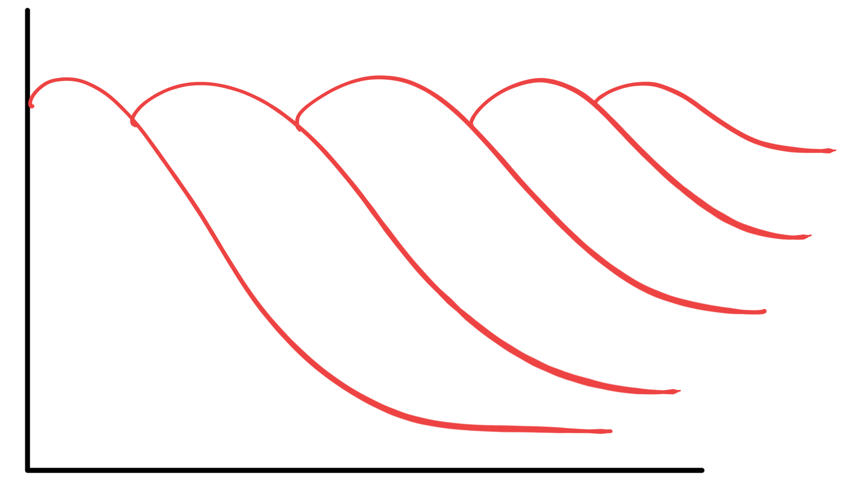This morning I was doing my daily flash card review and up came the image for “week”.
I had learnt this yesterday and knew that it contained a double image of someone I knew years ago called Anna.
Now I had used Anna’s image before when I saw her run through a busy campsite and headlong into a large bronze bell (as big as Big Ben). La campana (CAMP-ANNA) means bell in Spanish.
So her image was quite clear – and there were two of them.
I knew that the image in my mind represented the Spanish word for “Week” but the actual Spanish word just wouldn’t leap out at me.
It was something to do with two Annas’, maybe a double Anna…?
I had to mull this over in my mind for about 10-15 seconds and then it came to me.
The second Anna was the same as the first Anna – SAME-ANNA…
The word I was looking for was “la semana”, roughly pronounced “SAME-ANNA”.
Having a bit of a delay between seeing the image appear and the Spanish word coming to mind happens sometimes.
It is part of the journey.
In this instance, I eventually was able to access the memory and recall the word accurately – it just took a bit of time.
But now that I have done that, it has strengthened even more in my mind.
In fact the mental struggle and difficulty that I had in recalling it this time, will actually help cement it even stronger in my mind for the next time.
So what happened here was:
– I was presented with a picture representing a Spanish word
– That picture triggered an image I had created to help remember the word phonetically
– In this case that image was clear, BUT the link to the phonetics (SAME-ANNA) wasn’t as strong
– Eventually with a bit of mental searching I was able to remember what the phonetics were
– I then was able to say the word “semana”
One of the things to be aware of here is that sometimes the phonetic imagery you create may only approximate to what the word actually sounds like.
This is because linguistically, a syllable in Spanish may not have anything in English that can be used to represent it.
Often when you break down the phonetics of the Spanish word, you might have to be creative in generating something you can imagine that represents each syllable.
It isn’t always a like for like exercise.
Over time you will develop an understanding of what works for you. You will begin to appreciate you are memorising approximations that you then take to remind you of what the word should actually be.
Occasionally you will recall the approximation and say that instead of what it should actually sound like.
But if you are using the SRS in Anki, you will get immediate feedback from the audio file attached to the card, so you can correct yourself.
You might need to revisit the imagery to make it more relevant or stronger in your mind, but this usually only happens in the first couple of days.
From then on, it is fixed in your memory.
Of course every time you don’t get it quite right, you click the red button on the Anki Interface. This tells Anki to present that word again sooner and a little more often so you can get it right.
There is no harm or shame in this happening because it is part of the process – it is natural.
The Anki system can help you catch these and help you get them right sooner.
How Using Mnemonic Imagery Helps Learn Similar Sounding Words
One of the things that I like about learning the vocabulary this way is that I am presented with words organically without really being forced into particular scenarios.
This means I am gradually introduced to words and get to understand what they mean one by one.
So when a similar sounding or similarly spelt word comes along, I am able to make the distinction quite clearly.
As you will find there will be words that may differ by a single letter but will have completely different meanings.
If you only tried to learn the word and its translation (and not use pictures) it would be quite easy to get confused between similar sounding words.
Think what it might be like for someone learning English if they encounter the words DOCK, DECK and DUCK. They sound very similar and are similarly spelt words.
For you and I as native English speakers each word represents a completely different concept. They are as distinguishiable as night and day.
For a fledgling English speaker, they can be quite confusing. And this is similarly so for us when we encounter something similar in Spanish.
This is why using a mnemonic approach to memorising vocabulary really helps make those distinctions.
Let’s look at a couple of Spanish examples.
What about the words BANCO and BANCA?
One means bank and the other means bench.
Well you might cheat a little here as it is easy to equate BANCO to bank. But what about BANCA?
if you get an image of a banker (phonetically BANCA) and then see them sit on a bench (and perhaps the bench collapsing under the weight of all their bonuses?). That will help you identify BANCA as uniquely related to the bench..
That may be too obvious an example to prove my point so what about CARO (expensive), CORRER (to run), CARRERA (race or course)?
All very similar sounding words?
Well the distinction comes in the imagery you create that triggered by the individual sounds.
So the imagery of someone using an open topped car like a rowing boat (CARO – CAR-ROW) is unique.
You would then link that picture to one that represents expensive for you you. In my warped mind, I saw the car being rowed through lots of fur coats festooned with diamonds.
It is very different to an image of a member of the Irish group the Corrs running away with her excessively long hair streaming behind her (CORRER- CORR – HAIR). The running away bit gives the meaning of the word.
That image is very different from a car speeding away with it’s shock mane of hair blowing in the turbulence behind the speeding vehicle (CARRERA – CAR -HAIR-A).
It would be quite easy to link this to an image that represents a race. I had my hairy car weave its way in and out of a bunch of race horses in the Grand National.
Having worked through this imagery, when the similar sounding words come your way, you will know what they mean because you have made the distinction at the image level triggered by the phonetics.
I applied this same approach to AGUJA (needle) and AGUJERO (hole) whose similarity initially confused me.
This is just another advantage of using the mnemonic system.
Recall as Time Goes On
One of the many beautiful things about Anki is that it is sensitive to how well you are performing on the recall.
As long as you are being true to yourself and you let it know when you have got an answer wrong, it will adjust accordingly and present you your weaker words more often.
The other thing it does brilliantly is that it will present the words for you to recall at about the point the word is expected to begin fading from memory.
Its algorithm does this for you you automatically.
This is so you can give its existence in your brain another boost.
Each time you boost the word it will last longer in your brain until eventually it will become something you “just know”.
This is a better strategy than just forcing you into recognition of it in the early stages of the relationship you have with each word.

Constant repetition over a short space of time will just give you a sense of familiarity. This is where you confuse recognition with knowing.
Because you recognise the word whilst it washes around your short term memory, you assume you now know it. I like to call this the Fallacy of Familiarity.
However, the more time you spend recalling it over longer intervals, the better and the stronger the recall of that word will become.
Another great thing about the Anki system is that you are presented with three ways of testing yourself on each word you have learnt?
– Firstly you are presented with just the picture associated with the word and asked for the Spanish word
– Then you are presented with just the Spanish word and asked what it means
– And finally you are presented with the picture and the pronunciation and asked to spell the word.
Each time you answer one of these cards, you will reinforce the memory trace in your mind . These three ways of “testing” yourself add variety, challenge and feedback that will help you grow in ability and confidence.
I am finding this creates an upwardly spiralling loop of confidence and ability.
When I think of how I have tried to learn things in the past, it compares very differently. Doing it the “OLD” way I remember as a downward spiral of overwhelm and failure.
This is because of following someone else’s agenda a a pace not defined by me.
If all you have is the Word -> Meaning combination then it will not be as strong as the Word with links to the meaning, the image and the pronunciation
It’s a powerful way of approaching language learning and I don’t understand why more people aren’t taught it.







Leave A Response